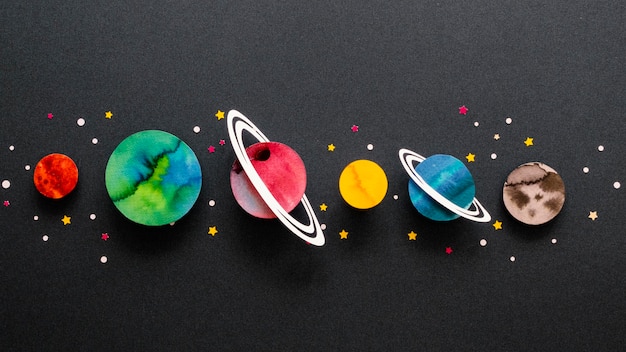Fascinating Facts about Space

The sun is so big that one million Earths could fit inside it.
There are more stars in the universe than there are grains of sand on all the beaches on Earth.
The shortest day in space is longer than a year on Earth.
Astronauts on the International Space Station witness 16 sunrises and sunsets every day.
The coldest place in the universe is in space, where temperatures can drop to -270 degrees Celsius.
Space is completely silent because there is no air to carry sound waves.
The largest volcano in the solar system is located on Mars and is three times taller than Mount Everest.
The fastest spinning celestial object is a pulsar, which rotates at a speed of 716 times per second.
Space is not completely empty and contains tiny particles called cosmic dust.
The largest known diamond in the universe is a massive star called BPM 37093.
Space is a vacuum, but it is not completely empty – it contains a very low density of particles.
Astronauts can grow taller in space due to the absence of gravity compressing their spines.
The Hubble Space Telescope can take incredibly sharp images, equivalent to seeing a pair of fireflies from 7,000 miles away.
The force of gravity is different on different planets, causing astronauts to weigh less or more depending on where they are in space.
Scientists estimate that there are at least 170 billion galaxies in the observable universe.
The Earth’s oxygen comes from plants through a process called photosynthesis.
Fascinating Facts about Space part 2
The first animal sent into space was a fruit fly on board a U.S. launched V-2 rocket in 1947.
While space is mostly empty, it is filled with magnetic fields that play a crucial role in the formation of planets and stars.
Astronauts have reported a distinct smell after coming back from a spacewalk, often described as a mix of seared steak, hot metal, and welding fumes.
The Great Red Spot on Jupiter is a massive storm that has been observed for over 300 years.
Space is constantly expanding, and the rate of expansion is accelerating.
The light from the Andromeda Galaxy takes about 2.5 million years to reach us, meaning we see it as it appeared 2.5 million years ago.
Saturn’s moon, Enceladus, has geysers that shoot out water vapor into space.
The tallest mountain in the solar system is on Mars and is named Olympus Mons. It is three times taller than Mount Everest.
The first person to travel to space was Yuri Gagarin from the Soviet Union in 196
The Pillars of Creation in the Eagle Nebula, captured by the Hubble Space Telescope, are giant columns of gas and dust where new stars are forming.
Jupiter has the shortest day among all the planets, completing one rotation in just under 10 hours.
The largest known asteroid is Ceres, which is considered a dwarf planet and makes up approximately 30% of the entire asteroid belt.
The moon has quakes, although they are called moonquakes. They are much weaker than earthquakes on Earth.
Space travel can cause changes in astronauts’ eyesight, with some experiencing a condition called space-induced visual impairment.
The first man to walk on the moon was Neil Armstrong, who took his famous step in 1969 during the Apollo 11 mission.
The center of our galaxy, the Milky Way, contains a supermassive black hole called Sagittarius A*.
The atmosphere on Venus is so thick that it exerts pressure 92 times greater than Earth’s atmospheric pressure.
The International Space Station (ISS) travels at a speed of about 17,500 miles per hour, orbiting the Earth approximately once every 90 minutes.
The coldest known place in the universe is the Boomerang Nebula, where temperatures drop to one Kelvin (-272.15 degrees Celsius).
The largest planet in our solar system is Jupiter, which is more than 11 times the diameter of Earth.
In 2015, NASA confirmed the existence of flowing liquid water on Mars, increasing the possibility of finding microbial life.
The closest known black hole to Earth is located just 1,600 light-years away in the constellation of Telescopium.
The Milky Way is on a collision course with the Andromeda Galaxy and is expected to collide in about 4 billion years.
Space travel affects the human immune system, making astronauts more susceptible to infections and illnesses.
The second man to walk on the moon was Buzz Aldrin, who joined Neil Armstrong during the Apollo 11 mission in 1969.
The hottest planet in our solar system is Venus, with an average surface temperature of around 880 degrees Fahrenheit (471 degrees Celsius).
While space is often described as a vacuum, it is not completely empty and contains extremely low-density gas and particles called the interstellar medium.
The average distance between stars in the Milky Way is about 5 light-years.
The study of space and all celestial objects is called astronomy.

